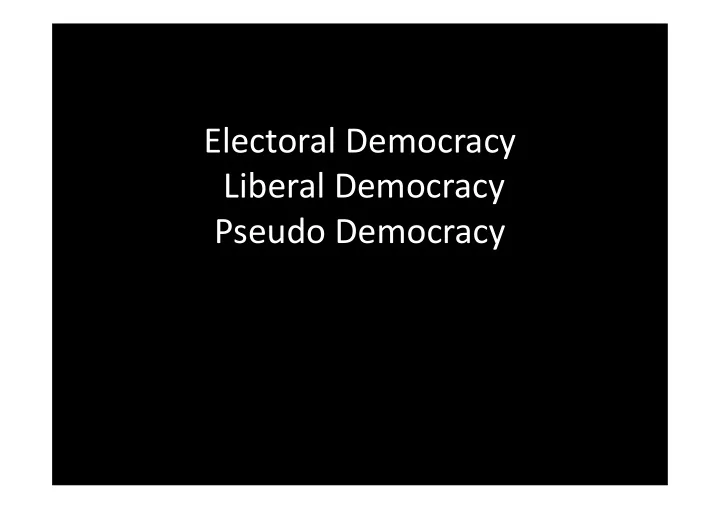

Electoral Democracy Liberal Democracy Pseudo Democracy
Prospects of Electoral and Liberal Democracy in Zimbabwe • Is Zimbabwe Ready for Electoral Democracy? • Or • Is it another civil war dubbed an election
What is Electoral Democracy? � A system of government at the level of the nation-state � A means for the people (with equal political rights as citizens) to choose their political leaders and (if they wish) to replace their leaders in regular , meaningful , free , and fair elections � Sufficient freedom for elections to be meaningful, free and, fair
Regular Elections at constitutionally prescribed intervals -presidential system (fixed term, 4-6 years) -parliamentary system (no later than every 4-5 years, typically) No delays or suspensions outside the law and the constitution
Meaningful Elections Elections should be consequential: They should decide who really exercises effective power in the country – No “ reserved domains of power ” – No supreme authority that is beyond electoral accountability (ZNA) – No ability of a higher authority (SERVICE CHIEFS) to set aside unpleasant outcomes
THE MAN TO WATCH!
Elections are Free when: � Low barriers (legally and practically) to enter the political arena � Freedom of candidates and parties to campaign and mobilize support � Freedom of people to assemble, advocate and vote, free of fear � Secret ballot � Low Political Violence � Broader climate of freedom: of speech, press, movement, assembly, & association
Elections are Fair when A reasonably level playing field exists between ruling and opposition parties 1. Neutral, competent, & professional electoral administration 2. Politically impartial police, military, courts 3. Broad access to the public media 4. Fair drawing and apportionment of electoral districts 5. Incumbents do not grossly abuse their office to advantage the ruling party
Elections are fair when [cont.] 6. Independent monitoring of the voting and vote counting 7. Full universal adult suffrage: no significant group of adults is excluded from the right to vote 8. Secret ballot 9. Effective methods to ensure accurate vote count 10. Established, impartial means to resolve election complaints and disputes
Rule of Law protects rights of citizens, maintains order, & limits power of government All citizens are equal under the law – No arbitrary arrest, exile, or imprisonment – No one is above the law – Government power is limited; no official – may violate these legal and constitutional limits The courts are independent in structure and – in fact
Rule of Law, cont. – Right to know the charges against you, presumption of innocence – Right to a fair, speedy, and public trial by an impartial court – No one may be taxed or prosecuted except by a law established in advance – No one may be subjected to torture or cruel and inhumane treatment
CIVIC CULTURE • “IF WE LOSE WE WILL GO BACK TO THE BUSH” • “I DIED FOR THIS COUNTRY!”. • THE GHOST OF 2008 • FAILURE OF NATIONAL HEALING, TRANSITIONAL JUSTICE AND RECONCILIATION
ELITE LED TRANSITION • ELECTIONS ALONE NOT SUFFICIENT • ZANU PF SUCCESSION STRUGGLE REACHING A GRAND FINALE • MDCT - ZANU PF MODERATES COALITION • CURTAILING THE POWER OF THE SECUROCRATS • ADDRESSING THE RESOURCE CURSE
IS ZIMBABWE READY FOR AN ELECTION? • CENSUS REVEALS POOR CIVIL – MILITARY RELATIONS • ZANU PF CONNECTIONS WITH THE ARMY A THREAT TO NATIONAL SECURITY • THE NEW DRAFT CONSTITUTION AN ACID TEST FOR AN ELECTION • THE RESOURCE CURSE ENRICHING THE MILITARY AND THE ZANU MAFIA
SOME SILVER LINING • SADC AND ZUMA MEDIATION FLEXING MUSCLE ON MUGABE • INCLUSIVE GOVERNMENT SLOWED DOWN MUGABE AND ZANU PF • CONSTITUTION MAKING PROCESS A NEGOTIATED PROCESS
VOTING WITH THE STOMACH
Recommend
More recommend